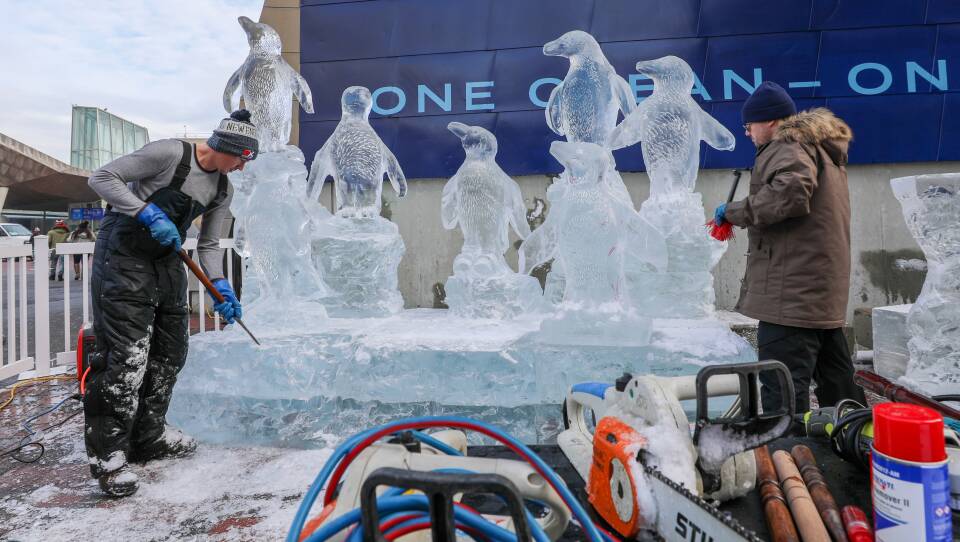The New England Aquarium’s annual ice sculpture was completed this week ahead of Boston’s Waterfront Ice Sculpture Stroll, taking place Saturday with 32 sculptures. And the aquarium’s entry this year might be a bit of a show-stealer, since it features their crowd-pleasing African penguins.
“I think people do love this species because they know they're endangered,” said Kristen McMahon-Van Oss, the aquarium’s curator of pinnipeds (think seals and sea lions) and penguins. “They really have a high threat of becoming extinct, possibly even in the next five to 10 years. So the fact that people love to watch and listen to penguins really enables us to make those connections and get people inspired about these animals and hopefully get them really involved in conservation efforts.”
For the 10-foot wide, 8-foot tall display, Don Chapelle of Brilliant Ice Sculpture carved 10,800 pounds of ice blocks in his Lawrence workshop, then fused the pieces together and made final touches at the aquarium on Wednesday.
“It’s always an honor to work with such an esteemed institution such as the New England Aquarium,” Chapelle said in a press release. “We have partnered for 16 years, and it’s been a pleasure designing and sculpting all sorts of mammals, fish and fauna.”
One of aquarium penguins represented in Chapelle’s sculpture — the one appropriately in the center — is “somewhat of a superstar,” said McMahon-Van Oss.
That would be the 24-year-old female named "Beach Donkey," who was so named because African penguins are known for their donkey-like, braying vocalizations.
“She's actually represented in that ice sculpture wearing sandals or Tevas,” McMahon-Van Oss said. “So Beach Donkey has had a condition called bumblefoot or pododermatitis, and her feet have had some calluses, for lack of a better word, on the bottom of them. And so she's had some foot treatments that the vet team has put in place . . . part of the plan was to put her in custom-made Tevas. So those are actually displayed in the ice sculpture. She's front and center among those seven penguins that you'll see.”
McMahon-Van Oss said getting the public excited about their animals, including the African penguins, connects to a core part of the aquarium’s mission of education and conservation.
“The African penguins are pretty close to our heart for a number of different reasons … over half of all of them are geriatric animals,” she said. “In the wild — African penguins along the southwestern coast of Africa — they live about 10 to 15 years. So quite a short life expectancy. But in aquariums, at zoos, they can live much, much longer. In fact, we have several in their 20s, several in their 30s, and we even have a 41-year-old.”
With temperatures reaching the 50s this weekend, aquarium staff are cautiously hoping the sculpture will last at least into New Year’s Day. McMann said they’ll use dry ice and tarp cover to protect it from the elements, but she encouraged visitors to come sooner rather than later.
“With ice sculptures, when they start to melt, the detail is the first thing that you lose,” she said. “So if people could get out there and see that ice sculpture really soon, I think that would be great because right now the penguins have real detail with their feathers and their eyes.”









